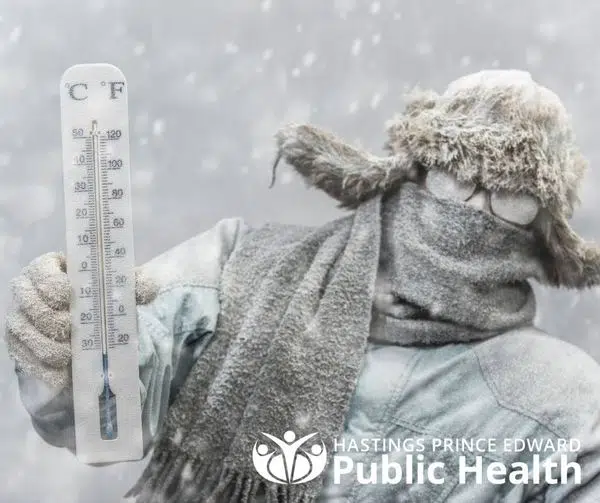Hastings Prince Edward Public Health (HPEPH) has issued a cold weather health warning to remind residents of Hastings and Prince Edward Counties to take precautions as the temperature drops. Cold temperatures can lead to health complications such as wind burn, frostbite and hypothermia. Environment Canada is forecasting temperatures of -21°C to -27°C with wind chill values between -28°C to -33°C this evening and into tomorrow morning.
Cold weather can negatively affect health at even mild temperatures. The risk of negative effects increases as temperatures get colder. People who are at a higher risk include:
- People experiencing homelessness;
- People living in homes that are poorly insulated (with no heat or power);
- People who work or exercise outside;
- People with certain medical conditions and certain medications;
- Infants (under 1 year); and
- Seniors (65 years or older)
Warming Centres
Those in need of shelter during the cold weather can access warming centres in:
- Bancroft: 103 Newkirk Boulevard, open 9 p.m. to 7 a.m.
- Belleville: 60 Bridge Street East, open from 8 p.m. to 8 a.m.
- Trenton: 85 Dundas Street East, open from 8 p.m. to 8 a.m.
Do your best to understand how to identify the health issues that can result from cold weather.
Windburn occurs when the cold wind removes the top layer of oil from the skin causing excessive dryness, redness, soreness and/or itchiness. Windburn can be treated with protective skin care products and lip balm. Do not rub or scratch the skin.
Frostbite occurs during cold weather when blood flow is severely restricted, resulting in poor circulation to the extremities causing numbness, white/greyish skin and/or skin that feels unusually firm or waxy. Frostbite can be treated by warming the body with blankets or body heat, or immersing the body in cool water and slowly increasing the water temperature. Do not rub or massage the skin.
Hypothermia occurs when the body temperature drops. There are three stages of hypothermia:
- Stage 1: Shivering and numbness, quick shallow breathing, tiredness and possible nausea.
- Stage 2: Strong shivering, muscles uncoordinated and movements are slow and laboured. Mild confusion, paleness and blue skin in extremities possible.
- Stage 3: No shivering, trouble thinking clearly, talking and walking, irrational behaviour. Heart may beat fast, but breathing slow. Risk of dying.
Severe cases of hypothermia (Stage 2 and 3) require immediate medical attention. Call 911. For Stage 1 and while waiting for help in Stages 2 and 3: keep warm and dry, keep muscles moving, drink warm sweet liquids, and allow shivering.
Whenever possible, wear clothing that will protect you from the cold including warm socks, gloves, hat and scarf and dress in layers with a wind resistant outer layer.






